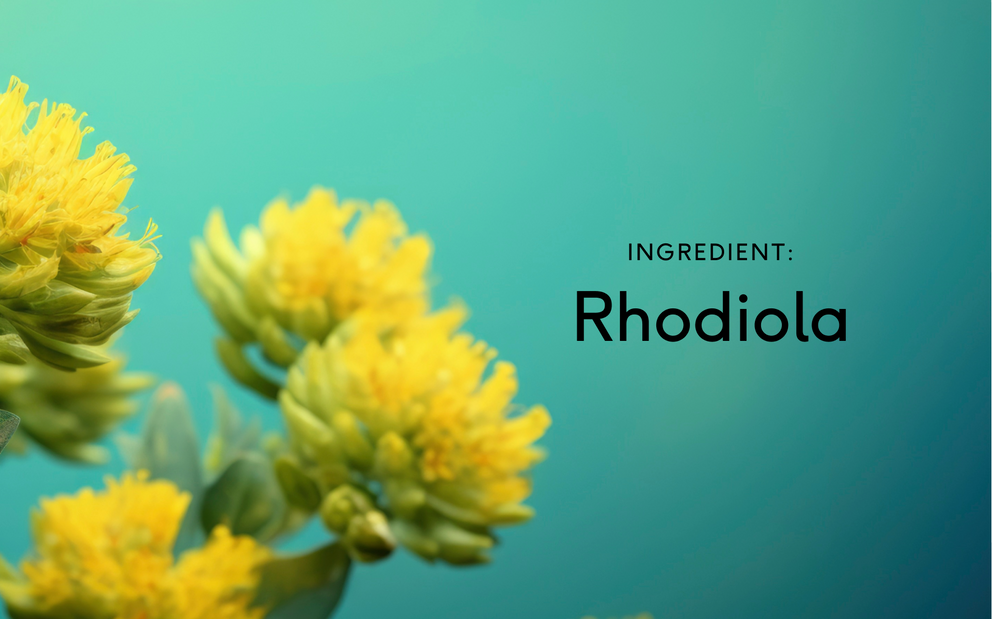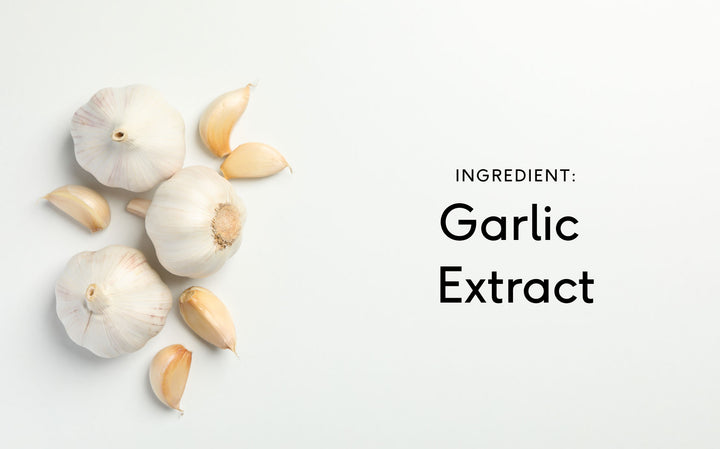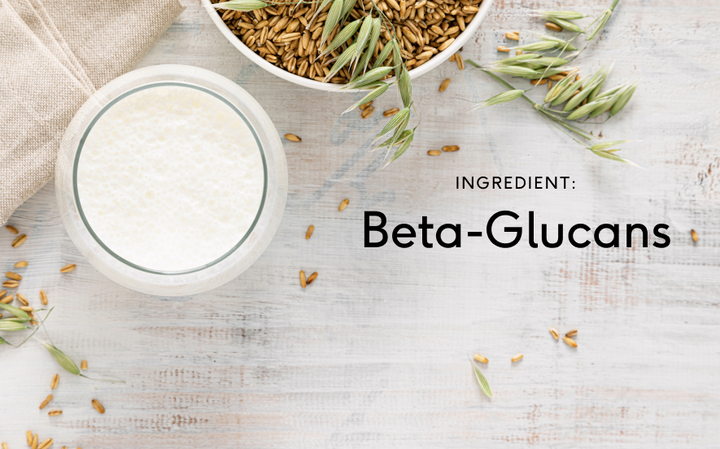Learn About Rhodiola in 5 Minutes
Table of contents

What is Rhodiola?
Rhodiola rosea, commonly known as rhodiola, is a flowering plant native to the Northern Hemisphere that is commonly used as ground cover. Rhodiola has been used as a healing tool for hundreds of years, and recently, Western science has begun recognising the health benefits of this unique plant. The primary beneficial component of rhodiola is called salidroside, and we use a rhodiola extract with 1% salidroside.
Is Rhodiola rosea water-soluble or fat-soluble?
Unlike many natural compounds, salidroside is water-soluble, which means that it has high bioavailability and absorbs into your body quickly.
Where can rhodiola be found naturally? Common sources of rhodiola:
The only known source of salidroside is the rhodiola flower, and the active compounds in rhodiola are usually prepared in oral supplement form.
What is the recommended daily value for rhodiola?
Since rhodiola is not recognised as an essential nutrient, there is no official nutrient reference value (NRV) for this flower extract. Clinical studies, however, commonly use rhodiola doses between 200mg and 600mg per day.
Can you absorb enough rhodiola from food?
The only way to consume the beneficial components of rhodiola is by ingesting rhodiola extract. Regardless of the type of diet you choose, it is not possible to ingest rhodiola extract in the food you eat.
Why is Rhodiola rosea necessary for your body?
For centuries, rhodiola has been used in both Western and Eastern medicine as a treatment for fatigue, depression, stress, and other conditions. Recent research indicates that rhodiola may have antioxidant properties, which would help explain why traditional medicine practitioners have found this substance so useful. In addition to appearing to offer general antioxidant benefits, rhodiola also appears to provide a few specific benefits that could be especially useful for active people who deal with continuous stress.
Functions of rhodiola
- Potential adaptogenic benefits: Researchers have identified rhodiola as a potential adaptogen, which means that this natural substance may help you adapt to stress in a healthy way.
- Potential physical and mental performance benefits: Research indicates that taking rhodiola extract may improve both physical and cognitive performance by reducing fatigue and enhancing concentration.
- Potential mood benefits: Studies suggest that rhodiola may be able to help with both anxiety and depression, which means that this plant extract may generally improve your mood.
- Potential eating disorder benefits: Research indicates that rhodiola may help prevent stress-eating and binge-eating, which are eating disorders that can contribute to serious conditions like anorexia and bulimia.
- Other potential benefits: Recent research indicates that rhodiola may also exert potent anti-inflammatory and neuroprotective benefits.
Rhodiola is considered to be a powerful adaptogen, perfect for helping your body to adapt to stress. Since experiencing stress can have a significant effect on sleep quality, we've included 100mg of Rhodiola in Feel Sleep to ensure you get a great night's sleep.
When should you take rhodiola?
People who experience significant job-related stress may stand to gain the most from the beneficial components of rhodiola extract. If you feel fatigued, stressed-out, or depressed, you may find rhodiola to be incredibly beneficial. This natural plant extract appears to be especially useful for people with eating disorders, but antioxidants are beneficial regardless of your health status or demographic group.
How long do you need to take rhodiola to start experiencing its benefits?
Since rhodiola extract is water-soluble and has high bioavailability, you may start experiencing the benefits of this substance immediately. In most cases, however, it takes around 1-2 weeks for the beneficial effects of rhodiola extract to set in.
Consistency is key and our research recommends taking your Feel supplements for at least 3 months to allow your body to adjust and provide you with the desired benefits.
How long does it take for your body to digest/absorb rhodiola?
As a water-soluble substance, the salidroside in rhodiola extract should fully absorb through your digestive tract within 24 hours.
How long does rhodiola stay in your body after you take it?
Water-soluble substances like the active compounds in rhodiola extract generally only stay in your body for 2-3 days.
Is Rhodiola rosea an antioxidant?
Research into salidroside indicates that this active component of rhodiola extract may exert potent antioxidant activity. These antioxidant benefits appear to be most concentrated in the cardiovascular and nervous systems.
Due to its adaptogenic properties, Rhodiola is considered effective for improving cognitive function, enhancing memory and learning, and protecting the brain. We've included 200mg of Rhodiola in Feel Focus to support your brain health and assist cognitive abilities.
Can you overdose on rhodiola? What are the effects?
There are no known cases of rhodiola overdose requiring medical intervention. If you take too much of this substance, you may experience nausea, vomiting, or dizziness.
Does rhodiola dissolve, flush out, or build up in the body?
Over time, taking large doses of salidroside could cause this substance to accumulate in your liver. Taken in normal doses, however, rhodiola extract dissolves and then flushes out of your body within 2-3 days.
Can you take rhodiola during a diet?
Since rhodiola is a plant-based substance, it does not conflict with gluten-free, vegan, or any other dietary restrictions.
Are there synthetic forms of Rhodiola rosea?
Over the last two decades, researchers have succeeded in synthesising salidroside. Most of the research into synthetic salidroside has centered around the potential applications of this substance for treating asthma.
Absorption rate of synthetic rhodiola
The limited number of studies conducted into synthetic salidroside do not provide any data on the bioavailability of this substance in comparison to natural salidroside. Since both substances are water-soluble, however, it’s likely that natural and synthetic salidroside have similar bioavailability.
Why might natural forms of rhodiola be better?
Not enough research has been conducted into synthetic salidroside to determine its safety and effectiveness compared to natural salidroside. It’s often the case, however, that synthetic forms of natural substances cause unexpected side effects.
How to take rhodiola
Rhodiola is consumed orally in the form of an extract.
Rhodiola trends in medicine
In 2020, a review of the available evidence concluded that rhodiola may exert powerful anti-inflammatory benefits. The authors report that these anti-inflammatory benefits may help with cardiovascular disease, neurological conditions, arthritis, metabolic disease, and other conditions. Also in 2020, a Chinese study determined that rhodiola may have neuroprotective benefits that defend the brain against common types of neurotoxicity.
Sources
1. Rhodiola rosea L.: an herb with anti-stress, anti-aging, and immunostimulating properties
2. Rhodiola rosea: A Versatile Adaptogen
3. The effects of an acute dose of Rhodiola rosea on exercise performance and cognitive function
4. A Randomised, Double-Blind, Placebo-Controlled, Parallel-Group Study of the Standardised Extract shr-5 of the Roots of Rhodiola Rosea in the Treatment of Subjects With Stress-Related Fatigue
5. A Pilot Study of Rhodiola rosea (Rhodax®) for Generalized Anxiety Disorder (GAD)
6. Rhodiola rosea versus sertraline for major depressive disorder: A randomized placebo-controlled trial
7. Effect of Salidroside, Active Principle of Rhodiola Rosea Extract, on Binge Eating
8. Rhodiola rosea L. extract reduces stress- and CRF-induced anorexia in rats
9. Anti-inflammatory effects of Rhodiola rosea L.: A review
10. Neuroprotective Effect of Rhodiola crenulata in D-Galactose-Induced Aging Model




















































 Back
Back





